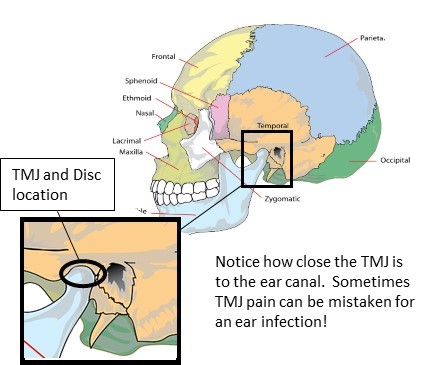Back to all Blogs / Challenges
Tweet

|

Click  Click
Click Click
Click
It isn’t always fun to be able to keep time with the clicking of your jaw whenever you open and close your mouth to talk, eat, or yawn. It's more common than you would think. A clicking jaw can be an alert to possible joint issues, but that annoying sound isn’t the only sign things could be amiss.
Each of us has two temporomandibular joints (abbreviated as TMJ), one on the right and one on the left. See the diagram below for a closer look at a TMJ. What most people don’t realize is that, like your spine, these joints have a disc. These discs helps keep the motion of your jaw smooth and they serve as shock absorbers for the joint. These, combined with a group of muscles, all work together with precision to provide you with impeccable jaw movement. Until, click, click, click… or some of the other symptoms below start to creep up on you.

Recognize any of these??
|
Ok, so let's dive in a little bit deeper. Let's have a little TMJ 101.
Who gets it: TMJ disorder (TMJD) tends to pop up more for women than men but both can develop it. Stress and anxiety is very highly correlated with TMJD, as both of those lead to clenching and muscle tightness. Also, new research shows that you may be at a higher risk of having TMJD if you have been diagnosed with any of the following: chronic fatigue syndrome, chronic headache, chronic migraines, endometriosis, fibromyalgia, interstitial cystitis, IBS, low back pain, sleep disorders, allergies, depression, or vulvodynia.(1,2)
|
Why does it happen: While determining the cause of TMJD can often be complicated (think of factors such as: sudden injury or mechanical, genetics, behavioral, and/or psychological) there are a few that tend to be the most common. As mentioned above, stress is a major player here. Clenching at night or throughout the day can alter the dynamics of the TMJ leading to dysfunction. Poor posture as well as compulsive gum chewing can also adversely affect the TMJ. What can you do: The traditional treatment for this is to get a bite guard to wear at night from your dentist or orthodontist. The problem there is that you still clench, so the joint itself is preserved, which is stellar, but your symptoms persist, which is not so stellar. Also, if you clench during the day, then the guard won't help at all. So then, back to the original question, what can you do? Luckily, there is acually a lot you can do! Interested? Look Right... |
Luckily, there is a lot you can do for TMJ. *Myofascial Release (massage technique) of chewing muscles *Gentle adjustment of restricted TMJ *Graston/Guasha soft tissue technique *Soft tissue work on muscles of neck *Adjustment of the neck if needed *Trigger point needle therapy *Stablizing and strengthening exercises for the jaw *Posture correction *Stress reduction through nutrition, supplementation, meditation, yoga , acupuncture |
||
You don't have to live in constant pain. While there are a lot of ways to treat TMJ and its symptoms, unfortunately finding a health care providers positioned to offer those treatments can be a little difficult. Seek out professionals that understand the importance of the TMJ and can offer at least a few if not all of the above mentioned treatments. If you have any questions or are wondering if your symptoms could be related to your jaw, please do not hesitate to talk to me about it. We provide full treatment of the TMJ, with the exception of providing bite guards, here at the Center for Chiropractic and Wellness and would love to help you in any way we can.
1. Hoffmann, Raymond G., et al. "Temporomandibular disorders and associated clinical comorbidities."
The Clinical journal of pain 27.3 (2011): 268-274.
2. Zenkevich, A. S., E. G. Filatova, and N. V. Latysheva. "[Migraine and temporomandibular joint dysfunction: mechanisms of comorbidity]."
Zhurnal nevrologii i psikhiatrii imeni SS Korsakova/Ministerstvo zdravookhraneniia i meditsinskoi promyshlennosti Rossiiskoi Federatsii, Vserossiiskoe obshchestvo nevrologov [i]
Vserossiiskoe obshchestvo psikhiatrov 115.10 (2014): 33-38.
For more blogs and updates, go to my Facebook Page.

